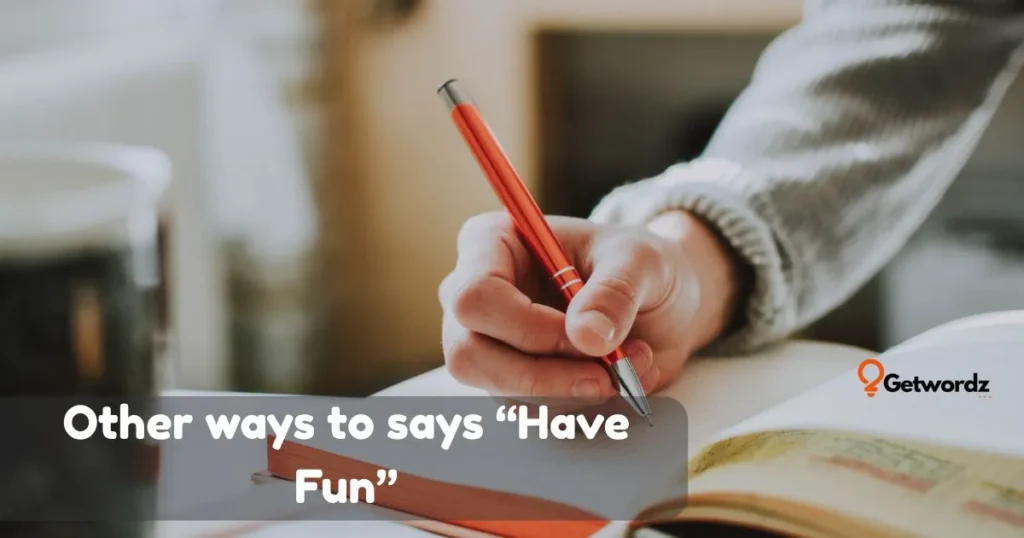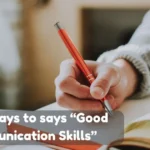“Have Fun” is more than just a casual farewell or a light-hearted wish, it’s a simple phrase we toss around to encourage enjoyment, laughter, and memorable moments.
Yet, how often do we find ourselves repeating it without thinking, leaving our messages feeling a little bland or predictable?
Whether you’re texting a friend, chatting with colleagues, cheering on a family member, or sending a playful note to your partner, the common “have fun” sometimes lacks that spark of creativity that truly connects.
That’s exactly why this post exists: to provide fresh, meaningful, and personal alternatives to “have fun.” From witty and funny responses to unique expressions that feel authentic, you’ll discover ways to elevate your everyday conversations.
These creative alternatives are perfect for all sorts of situations, parties, trips, games, or even casual hangouts, helping you communicate excitement and positivity in ways that feel genuine and memorable.
So, if you’ve ever wanted different ways to say “have fun,” better wording for your texts, or unique expressions to make someone smile, you’re in the right place. Keep reading, because the list ahead is packed with playful, clever, and heartwarming options you’ll actually want to use!
1. Have a Blast
Scenario: Imagine texting your friend who’s heading to a music festival this weekend. You want to send them a cheerful send-off that matches the excitement.
Explanation: “Have a blast” is a casual, energetic alternative to “have fun.” It conveys enthusiasm and positivity, making it a creative and relatable way to encourage enjoyment.
Examples:
- “Enjoy the concert tonight! Have a blast!”
- “Have a blast on your road trip, can’t wait to hear all about it!”
- “Packing for the beach? Have a blast and soak up the sun!”
Why It Works: This phrase stands out because it’s lively and playful, instantly conveying excitement while sounding genuine and upbeat.
2. Enjoy Yourself
Scenario: You’re seeing a colleague leave for a weekend getaway. A quick, friendly text feels perfect.
Explanation: “Enjoy yourself” is slightly more formal than “have fun” but still warm. It’s versatile, suitable for friends, family, or coworkers, making it a better wording alternative.
Examples:
- “Enjoy yourself at the spa today, you deserve it!”
- “Going to the party tonight? Enjoy yourself!”
- “Enjoy yourself on the hike; the views are incredible.”
Why It Works: Its flexibility and sincerity make it an excellent phrase for both casual and polite contexts.
3. Have a Good Time
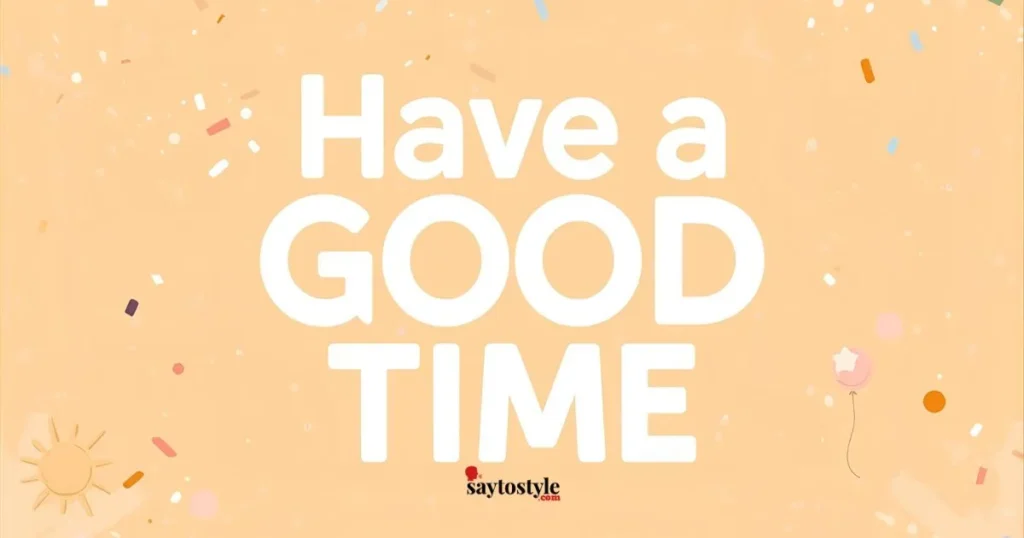
Scenario: Your cousin is heading out for their birthday dinner, and you want a simple, heartfelt send-off.
Explanation: “Have a good time” is a classic, reliable way to wish someone enjoyment. It’s neutral and adaptable, serving as a safe yet friendly alternative.
Examples:
- “Hope you have a good time at the movies!”
- “Have a good time celebrating your promotion!”
- “Don’t forget to have a good time on your weekend getaway.”
Why It Works: Its universality ensures it’s always appropriate, making it a versatile addition to your list of creative alternatives.
4. Live it Up
Scenario: Your best friend is heading to a weekend trip with friends. You want your message to feel lively and exciting.
Explanation: “Live it up” is energetic and fun, perfect for adventurous occasions. It’s a more vivid way to express “have fun,” adding a playful flair to your message.
Examples:
- “You’ve earned this vacation, live it up!”
- “Concert tonight? Go live it up!”
- “Graduation party coming? Live it up and enjoy every moment.”
Why It Works: The phrase feels spontaneous and spirited, which makes your encouragement feel memorable and exciting.
5. Make Memories
Scenario: A friend is going on a family vacation, and you want to inspire them to enjoy the experience fully.
Explanation: “Make memories” shifts focus from just fun to meaningful moments. It’s a thoughtful alternative to “have fun” and adds emotional depth.
Examples:
- “Have fun at the amusement park and make memories!”
- “Weekend trip to the mountains? Go make memories!”
- “Make memories while you’re at the family reunion.”
Why It Works: It’s heartfelt, personal, and resonates emotionally, making your message feel sincere and intentional.
Read more: 30 Other Ways To Say “The End In a Story” With Examples!
6. Have an Amazing Time
Scenario: A colleague is attending an important networking event. You want to be enthusiastic yet polite.
Explanation: “Have an amazing time” elevates the standard “have fun” with extra enthusiasm. It’s positive and encouraging without being overly casual.
Examples:
- “Enjoy the gala, have an amazing time!”
- “Have an amazing time exploring the city!”
- “Travel safe and have an amazing time with your friends.”
Why It Works: It emphasizes positivity and excitement, giving the recipient a boost before any event.
7. Enjoy Every Moment
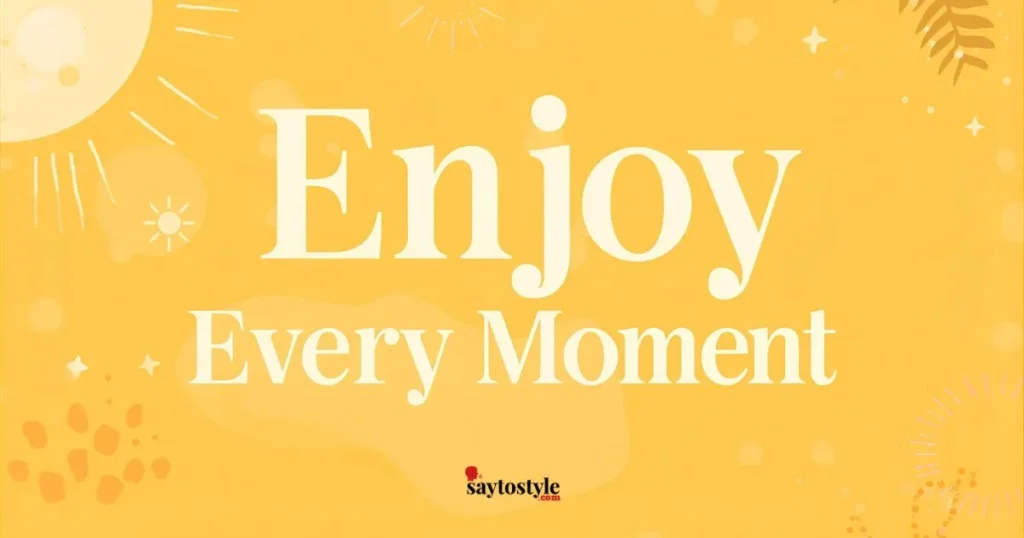
Scenario: Your partner is going on a short vacation, and you want to send a heartfelt text.
Explanation: “Enjoy every moment” is reflective and meaningful. It encourages mindfulness while being a warm alternative to “have fun.”
Examples:
- “Enjoy every moment of your weekend getaway!”
- “Concert tonight? Enjoy every moment!”
- “Make the most of the trip and enjoy every moment.”
Why It Works: Its thoughtful tone adds depth, making your encouragement feel more sincere and memorable.
8. Have a Ball
Scenario: Your friends are attending a lively birthday party, and you want a playful send-off.
Explanation: “Have a ball” is informal and cheerful. It’s a unique expression that keeps communication fun and lighthearted.
Examples:
- “Hope you have a ball at the party!”
- “The festival sounds amazing, have a ball!”
- “Have a ball celebrating with your team tonight!”
Why It Works: Its casual, joyful tone makes it ideal for friends and social events, offering a creative alternative.
9. Party On
Scenario: Your cousin is heading to a weekend festival. You want to sound trendy and upbeat.
Explanation: “Party on” is modern and casual. It conveys energy and celebration, a witty alternative to a simple “have fun.”
Examples:
- “The festival starts tonight!”
- “Graduation weekend? Party on and enjoy!”
- “Party on at your birthday bash this weekend!”
Why It Works: Short, memorable, and spirited, it conveys excitement perfectly for youthful or lively contexts.
10. Go Have Fun
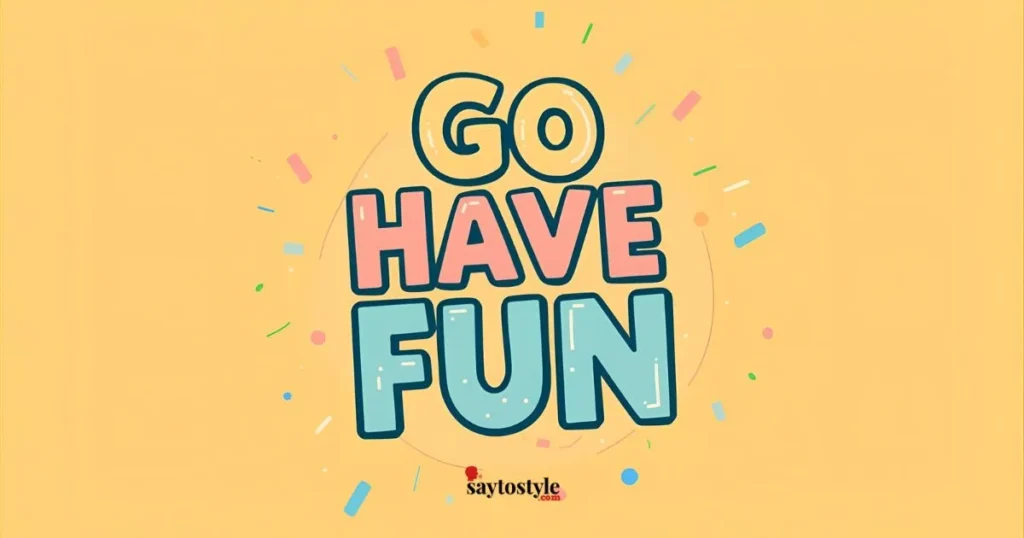
Scenario: Your little sibling is about to play soccer with friends. You want to be encouraging but casual.
Explanation: “Go have fun” is direct, friendly, and motivational. It’s slightly more playful than the standard “have fun,” making it suitable for everyday situations.
Examples:
- “Go have fun at the park with your friends!”
- “Go have fun at the carnival!”
- “Birthday party today? Go have fun!”
Why It Works: Its simplicity and cheerfulness make it easy to use in multiple contexts while staying warm and authentic.
Read more: 30 Other Ways To Say “Happy Married Life” With Examples!
11. Enjoy the Ride
Scenario: Your friend is starting a new adventure, like a road trip or a new hobby. You want to wish them excitement along the way.
Explanation: “Enjoy the ride” is playful and metaphorical. It’s a creative alternative to “have fun,” emphasizing the journey and experiences rather than just the activity.
Examples:
- “New hiking trail today? Enjoy the ride!”
- “Starting your first day at the art class, enjoy the ride!”
- “Weekend road trip? Enjoy the ride and take lots of photos!”
Why It Works: It adds a sense of adventure and curiosity, encouraging someone to embrace every moment naturally.
12. Have a Joyful Time
Scenario: A family member is heading to a festive event, like a wedding or reunion. You want to keep the tone warm and meaningful.
Explanation: “Have a joyful time” is heartfelt and slightly formal. It conveys genuine happiness for the person, making it a more expressive alternative.
Examples:
- “Have a joyful time at grandma’s birthday party!”
- “Enjoy your evening, have a joyful time with friends!”
- “Wedding ceremony today? Have a joyful time celebrating!”
Why It Works: Its sincerity and positivity make it suitable for both personal and formal occasions.
13. Enjoy Your Day
Scenario: Someone is starting their first day at a new job or school. A friendly and uplifting message is perfect.
Explanation: “Enjoy your day” is simple, supportive, and versatile. It can be used in casual, formal, or digital contexts, making it a strong alternative.
Examples:
- “First day at the new job? Enjoy your day!”
- “Enjoy your day at the festival, can’t wait for your stories!”
- “Heading out for errands? Enjoy your day!”
Why It Works: It’s universally appropriate, thoughtful, and effortlessly polite.
14. Have Loads of Fun
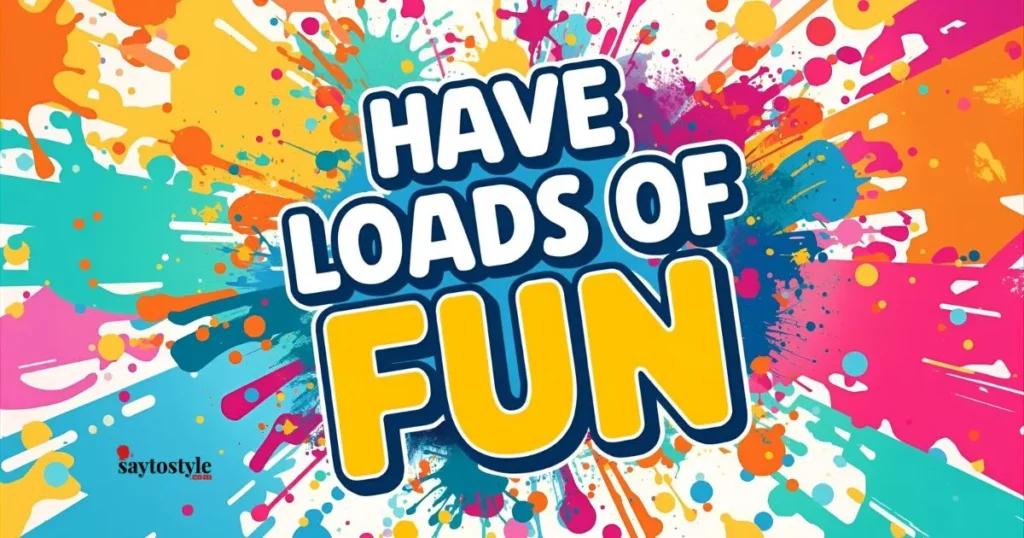
Scenario: Your friend is attending a big weekend event like a fair or concert. You want to sound enthusiastic.
Explanation: “Have loads of fun” is lively and friendly. Adding “loads of” makes it feel more casual and energetic than plain “have fun.”
Examples:
- “Have loads of fun at the amusement park!”
- “Going to the music festival? Have loads of fun!”
- “Birthday party tonight? Have loads of fun dancing!”
Why It Works: Its enthusiastic tone makes it perfect for younger audiences and social contexts.
15. Make It Fun
Scenario: Your sibling is about to start a creative project or team activity. You want to encourage them to enjoy it fully.
Explanation: “Make it fun” is proactive and engaging. It suggests not just enjoying the activity but actively creating joy.
Examples:
- “Team project today? Make it fun!”
- “Cooking challenge at home? Make it fun!”
- “Family game night? Make it fun and hilarious!”
Why It Works: It encourages creativity and adds a playful, hands-on dimension to the typical “have fun.”
Read more: 30 Other Ways To Say “Happy Wedding Anniversary”
16. Have a Wonderful Time
Scenario: Your friend is traveling to a city they’ve always wanted to visit. You want your message to feel warm and sincere.
Explanation: “Have a wonderful time” is uplifting and positive. It’s slightly more elegant than “have fun” and works well in diverse contexts.
Examples:
- “Exploring Paris this weekend? Have a wonderful time!”
- “Dinner with friends tonight? Have a wonderful time!”
- “Beach vacation coming up? Have a wonderful time!”
Why It Works: Its charm and sincerity make it a versatile, feel-good alternative that suits nearly any situation.
17. Enjoy Your Adventure
Scenario: A friend is embarking on a new experience, like skydiving or traveling abroad. You want to sound inspiring.
Explanation: “Enjoy your adventure” conveys excitement and encouragement. It’s a more vivid, meaningful way to wish someone fun.
Examples:
- “Skydiving today? Enjoy your adventure!”
- “Backpacking trip coming up? Enjoy your adventure!”
- “Starting a new hobby? Enjoy your adventure every step of the way!”
Why It Works: Its adventurous tone makes it feel unique and personal, emphasizing experiences over just fun.
18. Have a Delightful Time
Scenario: Someone is attending a tea party or a cultural event. You want a polite, charming alternative.
Explanation: “Have a delightful time” is warm and refined. It conveys happiness for the person while being slightly more sophisticated than “have fun.”
Examples:
- “Afternoon tea with friends? Have a delightful time!”
- “Enjoy the museum tour and have a delightful time!”
- “Family gathering today? Have a delightful time!”
Why It Works: Its elegance and positivity make it suitable for semi-formal or thoughtful contexts.
19. Enjoy Yourself to the Fullest
Scenario: Your friend is heading to a weekend getaway or celebration. You want a bold, encouraging message.
Explanation: “Enjoy yourself to the fullest” emphasizes maximum enjoyment. It’s a creative alternative that conveys both excitement and care.
Examples:
- “Concert tonight? Enjoy yourself to the fullest!”
- “Trip to the mountains? Enjoy yourself to the fullest!”
- “Birthday bash coming? Enjoy yourself to the fullest!”
Why It Works: It feels heartfelt, enthusiastic, and highly motivating, making the recipient feel encouraged to savor every moment.
20. Have a Memorable Time
Scenario: A friend is attending a special event, like a graduation or wedding. You want to make your message extra meaningful.
Explanation: “Have a memorable time” focuses on creating lasting experiences. It’s thoughtful and elevates the traditional “have fun.”
Examples:
- “Graduation party tonight? Have a memorable time!”
- “Trip with friends? Have a memorable time exploring new places!”
- “Family reunion? Have a memorable time catching up!”
Why It Works: Its meaningful tone sets it apart from casual alternatives, making your wish feel thoughtful and genuine.
Read more: 30 Other Ways To Say “Happy To Hear That” With Examples!
21. Have Fun Galore
Scenario: Your friends are attending a large festival or amusement park. You want your message to be cheerful and playful.
Explanation: “Have fun galore” is fun, lively, and emphasizes abundance. It’s a creative, cheerful alternative to plain “have fun.”
Examples:
- “Roller coaster day? Have fun galore!”
- “Carnival tonight? Have fun galore!”
- “Beach day with friends? Have fun galore!”
Why It Works: Its playful exaggeration makes it stand out and conveys energy and excitement effectively.
22. Have a Fantastic Time
Scenario: Your colleague is attending a work retreat. You want to sound upbeat but professional.
Explanation: “Have a fantastic time” is enthusiastic yet versatile. It conveys excitement and support, making it a polished alternative.
Examples:
- “Team-building retreat? Have a fantastic time!”
- “Company dinner tonight? Have a fantastic time!”
- “Conference this weekend? Have a fantastic time networking!”
Why It Works: Its professional yet friendly tone makes it adaptable to both formal and casual settings.
23. Enjoy Every Second
Scenario: A friend is attending a once-in-a-lifetime event, like a concert or graduation. You want to highlight savoring the moment.
Explanation: “Enjoy every second” is meaningful and reflective. It emphasizes mindfulness and presence, a thoughtful alternative to “have fun.”
Examples:
- “Graduation day? Enjoy every second!”
- “Concert tonight? Enjoy every second of it!”
- “Trip abroad? Enjoy every second exploring!”
Why It Works: Its reflective tone makes it heartfelt, reminding someone to appreciate the experience fully.
24. Make It Count
Scenario: Your sibling is heading to a weekend sports tournament or creative workshop. You want to inspire them to enjoy it fully.
Explanation: “Make it count” is motivational and action-oriented. It encourages engagement, making it a clever alternative.
Examples:
- “Basketball game today? Make it count!”
- “Art workshop? Make it count and have fun!”
- “Family picnic? Make it count with lots of laughter!”
Why It Works: Its motivational tone feels personal and inspiring, urging the recipient to maximize their enjoyment.
25. Have a Cheerful Time
Scenario: A friend is attending a casual gathering or party. You want to wish them happiness and positivity.
Explanation: “Have a cheerful time” is warm and friendly. It’s a subtle alternative to “have fun,” emphasizing mood and positivity.
Examples:
- “Book club tonight? Have a cheerful time!”
- “Picnic with friends? Have a cheerful time!”
- “Evening out? Have a cheerful time laughing and chatting!”
Why It Works: Its cheerful tone is friendly and uplifting, perfect for casual or lighthearted occasions.
Read more: 30 Other Ways To Say “Save The Date” With Examples!
26. Have a Great Time
Scenario: Your friend is going on a weekend trip or attending a casual event. You want a simple, classic send-off.
Explanation: “Have a great time” is straightforward and widely understood. It’s a reliable, friendly alternative suitable for almost any context.
Examples:
- “Weekend getaway? Have a great time!”
- “Birthday party tonight? Have a great time!”
- “Lunch outing with friends? Have a great time!”
Why It Works: Its simplicity and positivity make it versatile and easy to use anywhere, any time.
27. Enjoy the Moment
Scenario: Your partner is attending a romantic or special event. You want your message to feel intimate and meaningful.
Explanation: “Enjoy the moment” emphasizes mindfulness and presence. It’s a thoughtful alternative that goes beyond just casual fun.
Examples:
- “Dinner date tonight? Enjoy the moment!”
- “First dance at the wedding? Enjoy the moment!”
- “Movie night? Enjoy the moment together!”
Why It Works: Its intimate and reflective tone adds emotional depth, making your encouragement feel sincere.
28. Have a Lively Time
Scenario: Friends are going out to a concert or festival. You want to match the upbeat energy.
Explanation: “Have a lively time” conveys energy, excitement, and sociability. It’s a vivid alternative to plain “have fun.”
Examples:
- “Concert tonight? Have a lively time dancing!”
- “Street festival this weekend? Have a lively time!”
- “Family game night? Have a lively time competing!”
Why It Works: Its energetic tone makes your wish feel dynamic, exciting, and memorable.
29. Have a Fun-Filled Day
Scenario: A friend is heading into a day full of activities or adventures. You want to emphasize enjoyment from start to finish.
Explanation: “Have a fun-filled day” is descriptive and cheerful. It’s a creative alternative that communicates abundant enjoyment.
Examples:
- “Theme park today? Have a fun-filled day!”
- “Shopping trip? Have a fun-filled day exploring!”
- “Outdoor adventure? Have a fun-filled day hiking!”
Why It Works: Its descriptive nature makes it engaging and expressive, adding warmth and personality to your message.
30. Keep Enjoying
Scenario: Someone is already on vacation or attending an event. You want to encourage ongoing enjoyment.
Explanation: “Keep enjoying” is casual, supportive, and continuous. It’s a modern, flexible alternative to “have fun.”
Examples:
- “On your road trip? Keep enjoying every stop!”
- “Music festival? Keep enjoying the vibes!”
- “Weekend retreat? Keep enjoying all the activities!”
Why It Works: Its casual encouragement feels personal and motivating, making it perfect for ongoing experiences.
Pros and cons of using “Have Fun”
pros
- Simple and Clear: Easily understood in any context, making it widely applicable for friends, family, or colleagues.
- Positive Tone: Conveys encouragement, excitement, and goodwill in a friendly way.
- Versatile Usage: Can be used in texts, social media, emails, or casual conversation.
- Quick to Write or Say: Short and direct, perfect for casual interactions or quick messages.
- Universal Appeal: Recognized across cultures and age groups as a friendly expression of enjoyment.
Cons
- Overused Phrase: Can sound generic or repetitive if used too frequently.
- Lacks Personalization: Doesn’t convey specific sentiment or unique encouragement.
- Casual Tone Only: Not suitable for very formal or professional settings.
- Limited Creativity: Doesn’t offer excitement or variation compared to alternatives like “Have a blast” or “Make memories.”
- May Feel Impersonal: In messages meant to feel heartfelt or reflective, it can come across as bland.
Closing words
Have Fun doesn’t have to be a simple, overused phrase anymore. By exploring fresh alternatives, creative expressions, and unique wording, you can make your messages more engaging and memorable.
These different ways to say “have fun” help you avoid repetitive phrasing while keeping your communication lively and thoughtful.
Whether you’re texting friends, leaving notes for colleagues, posting on social media, or sending greeting cards, these creative alternatives and fresh wording options add personality and charm.
Try using one of these phrases in your next message, it’s a small change that makes a big difference. By choosing thoughtful, authentic expressions, you enhance clarity, connection, and impact.
Next time you want to wish someone enjoyment, using Have Fun alternatives will make your words stand out, feel genuine, and spread positivity.


